Blackbird (26 page)
The postmark was smeared, but I could see it had been stamped in El Paso sometime in July. Marshall had drawn little five-pointed stars around the address: “Johnnie Ray Rousseau, Student, University of California, Los Angeles.” It was a miracle it ever found its way to me at all. It read:
Jukebox selections in Van Horn’s Sands Café include Earth, Wind & Fire, Elton John, and Dobie Gray singing “Drift Away.” Anti-nudists in Massachusetts maintain that nudity is contributing to the erosion of the sand dunes in Cape Cod – Channel 3 Evening News, Phoenix. Temp 105 in Phoenix; 106 in El Paso. I’m having walking nightmares listening to what the gov’t is doing with nuclear energy. Thanks for coming to my film. I’m working on a letter to you. Marshall.
I’ve been using the postcard as a bookmark for my French textbook, and taking it with me everywhere.
There’s a radio on the old metal desk across the office from Rod and me. Right now, Dobie Gray is singing “Drift Away.”
You couldn’t slap this smile off my face.
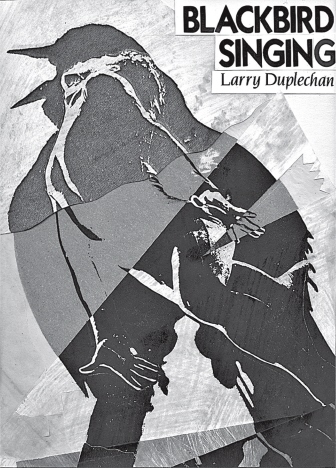
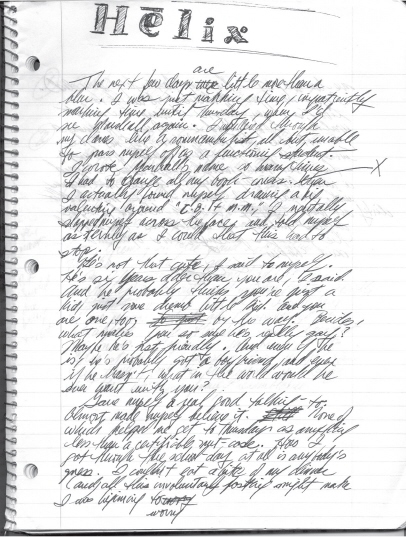
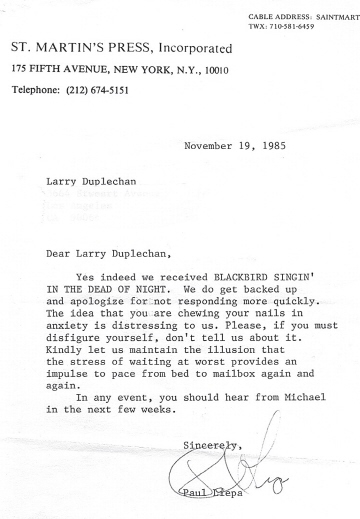
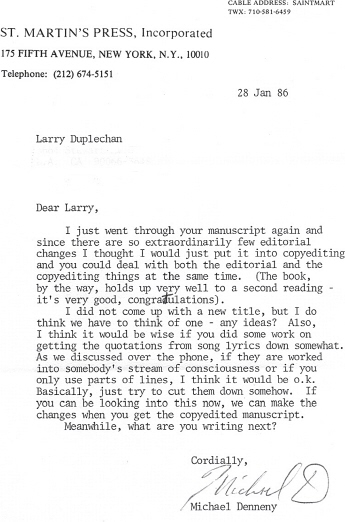
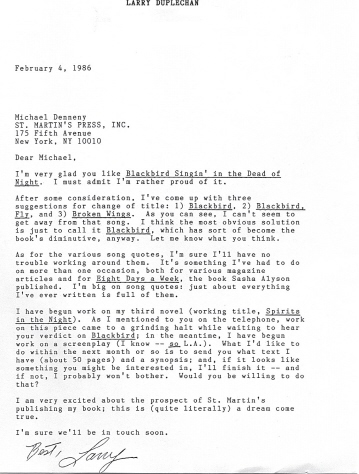
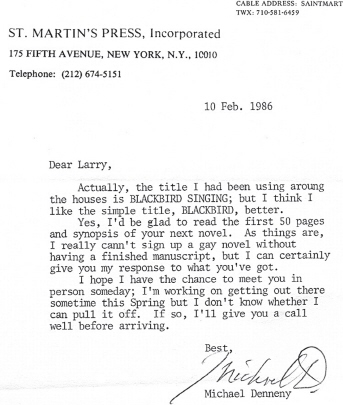
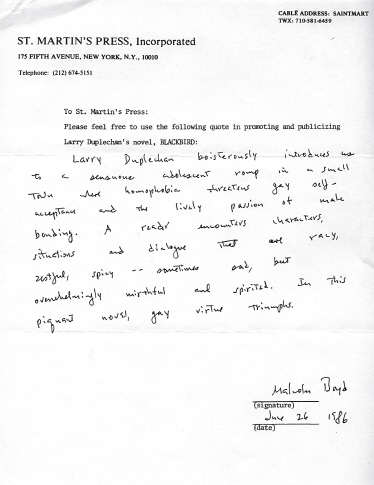
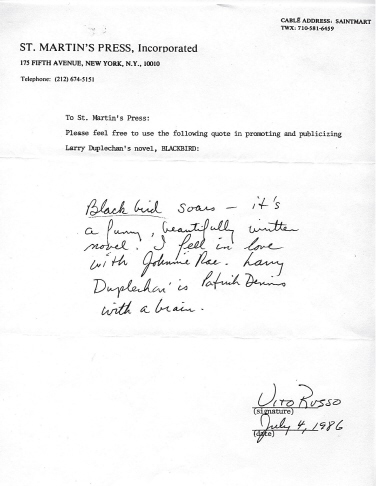
From
The Advocate
, December 23, 1986
Essential Lessons Shared in Black Coming Out Tale
, by Joseph Bean
Peeking over the shoulders of black writers are a vast assortment of critics with expectations as varied as their number. Because of the paucity of black literature some critics demand that said creations present positive images and progressive politics. Others, no doubt thinking of the marketplace and reader accessibility, require a certain level of universality and symbolism. In
Blackbird
, the “pre-quel” (the opposite of sequel) to
Eight Days a Week
(Alyson), Larry Duplechan reaches a satisfying denominator, which is not at all common.
Both novels feature black protagonist Johnnie Ray Rousseau. In
Eight
Days a Week
, he’s twenty-two and hooked on a white banker a decade his senior; in
Blackbird
, he’s seventeen and about to graduate from a bedroom-community high school forty miles from Los Angeles. Johnnie Ray is a talented singer and according to everyone, the finest actor in this suburban student body. He is also gay, a fact unknown to almost everyone, except his best friend, indeed his “girlfriend,” Efrem, who is white and also gay. It is Efrem who encourages Johnnie to audition for the lead in the ironically titled “Hooray for Love,” a comedy revue, which, among its vignettes, features the balcony scene from
Romeo and Juliet
. Johnnie
knows
– even in 1974, in the liberal state of California – that a black boy can’t kiss a white girl (a shoo-in for the female lead happens to be Mormon). As consolation, he’s offered a student directorship at which he doesn’t shout hooray.
But there’s more drama than the student play. There’s Todd, boyfriend of the minister’s daughter, Leslie, who he gets pregnant; Cherie, the cherub-faced black co-ed who decides it’s time Johnnie Ray learned about the birds ’n’ bees; Efrem, who is bashed and hospitalized. Then there’s Crystal or Carolann, who’s not schizophrenic, but has a dual personality distinguished only by her outfits. Meanwhile, Johnnie goes to an exorcist. Finally, there’s Marshall, the experimental filmmaker, who turns Johnnie Ray on to marijuana and sex with a man.
Blackbird
is zany and sentimental, chock full of anachronistic teenage colloquialisms like boner and up-chuck. We are thoroughly reminded of the tacky, tie-dyed, macraméd early 1970s, the Age of Aquarius. But love is anything but free for these kids. It’s Love and Consequences, which Duplechan handles deftly, more successfully than in
Eight Days a Week
.
This time out his pen moves with more surety. There is a neatness of design and execution, a certain subtle symbolism. The Duplechan device of using pop artists and song titles, which seemed in
Eight
Days a Week
to be too clever a kind of shorthand, is used more sparingly and thus more evocatively in
Blackbird
.
What makes
Blackbird
important and essential reading is not merely that it is the first contemporary black coming out story, but its depiction of late adolescence, that precarious approach to adulthood. In the end,
Blackbird
is about learning to love, learning to heal, learning to fly. This critic can say only one thing to black gay novelist Larry Duplechan: We have all been waiting for this novel to arrive.
From
Gay Community News
, May 10–16, 1987
Blackbird
Sings
, by Michael Bronski
Twenty years ago there were so few “gay” books available that the common homosexual reader cherished each and every one. (Many times against her or his better judgment.) Ten years ago there were enough books on gay themes being published that one had the privilege to pick and choose, as well as the freedom to disregard inferior, or just plain dumb, titles. Now as gay publishing – both mainstream and small press – releases a fair number of books each year (although still miniscule compared to the rest of the industry) readers not only have more wheat but a good deal more chaff to sort through.
I read most of the gay fiction that comes out: a mixed bag ranging from horrible junk, to interesting junk, to well-intentioned, to pretty good, to great. As with all publishing, most of it is middling. The problem is that there are so few great books: books that make you sit up and laugh or cry or move you in any way, books that sound like they had been written by someone who has something to say and a voice with which to say it. So many books read as thought they had been written by a computer that to find a book with personality and character is a joy.
Blackbird
by Larry Duplechan is this sort of book.
It’s hard to pinpoint why
Blackbird
is so good. Part of the reason is that Duplechan is quite modest in his story’s scope and intent. The plot takes a few weeks in the life of Johnnie Ray Rousseau – a gay, Black, high-school student in Southern California – as he comes to grips with his sexuality and with the realization that growing up means having to deal with a very real, sometimes quite dangerous world where the only person you can really trust is yourself and your instincts.